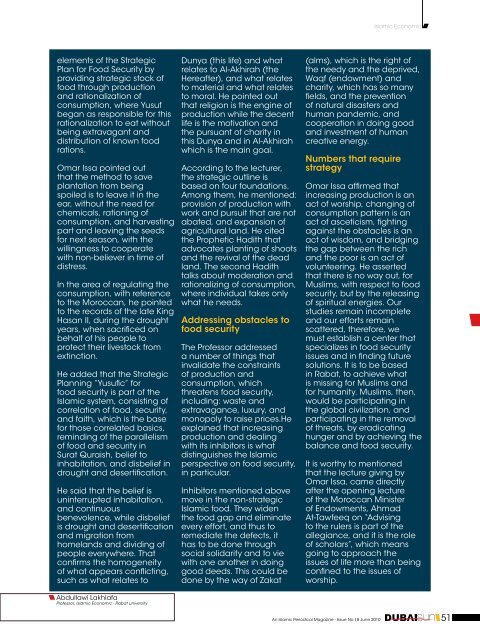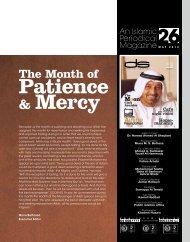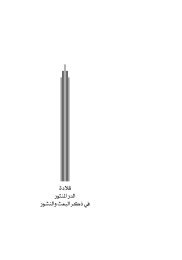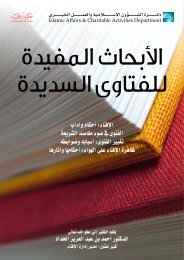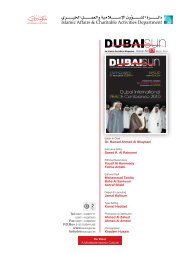Orphan Rights
Orphan Rights
Orphan Rights
You also want an ePaper? Increase the reach of your titles
YUMPU automatically turns print PDFs into web optimized ePapers that Google loves.
Islamic Economicelements of the StrategicPlan for Food Security byproviding strategic stock offood through productionand rationalization ofconsumption, where Yusufbegan as responsible for thisrationalization to eat withoutbeing extravagant anddistribution of known foodrations.Omar Issa pointed outthat the method to saveplantation from beingspoiled is to leave it in theear, without the need forchemicals, rationing ofconsumption, and harvestingpart and leaving the seedsfor next season, with thewillingness to cooperatewith non-believer in time ofdistress.In the area of regulating theconsumption, with referenceto the Moroccan, he pointedto the records of the late KingHasan II, during the droughtyears, when sacrificed onbehalf of his people toprotect their livestock fromextinction.He added that the StrategicPlanning “Yusufic” forfood security is part of theIslamic system, consisting ofcorrelation of food, security,and faith, which is the basefor those correlated basics,reminding of the parallelismof food and security inSurat Quraish, belief toinhabitation, and disbelief indrought and desertification.He said that the belief isuninterrupted inhabitation,and continuousbenevolence, while disbeliefis drought and desertificationand migration fromhomelands and dividing ofpeople everywhere. Thatconfirms the homogeneityof what appears conflicting,such as what relates toAbdullawi LakhlafaProfessor, Islamic Economic - Rabat universityDunya (this life) and whatrelates to Al-Akhirah (theHereafter), and what relatesto material and what relatesto moral. He pointed outthat religion is the engine ofproduction while the decentlife is the motivation andthe pursuant of charity inthis Dunya and in Al-Akhirahwhich is the main goal.According to the lecturer,the strategic outline isbased on four foundations.Among them, he mentioned:provision of production withwork and pursuit that are notabated, and expansion ofagricultural land. He citedthe Prophetic Hadith thatadvocates planting of shootsand the revival of the deadland. The second Hadithtalks about moderation andrationalizing of consumption,where individual takes onlywhat he needs.Addressing obstacles tofood securityThe Professor addresseda number of things thatinvalidate the constraintsof production andconsumption, whichthreatens food security,including: waste andextravagance, luxury, andmonopoly to raise prices.Heexplained that increasingproduction and dealingwith its inhibitors is whatdistinguishes the Islamicperspective on food security,in particular.Inhibitors mentioned abovemove in the non-strategicIslamic food. They widenthe food gap and eliminateevery effort, and thus toremediate the defects, ithas to be done throughsocial solidarity and to viewith one another in doinggood deeds. This could bedone by the way of Zakat(alms), which is the right ofthe needy and the deprived,Waqf (endowment) andcharity, which has so manyfields, and the preventionof natural disasters andhuman pandemic, andcooperation in doing goodand investment of humancreative energy.Numbers that requirestrategyOmar Issa affirmed thatincreasing production is anact of worship, changing ofconsumption pattern is anact of asceticism, fightingagainst the obstacles is anact of wisdom, and bridgingthe gap between the richand the poor is an act ofvolunteering. He assertedthat there is no way out, forMuslims, with respect to foodsecurity, but by the releasingof spiritual energies. Ourstudies remain incompleteand our efforts remainscattered, therefore, wemust establish a center thatspecializes in food securityissues and in finding futuresolutions. It is to be basedin Rabat, to achieve whatis missing for Muslims andfor humanity. Muslims, then,would be participating inthe global civilization, andparticipating in the removalof threats, by eradicatinghunger and by achieving thebalance and food security.It is worthy to mentionedthat the lecture giving byOmar Issa, came directlyafter the opening lectureof the Moroccan Ministerof Endowments, AhmadAt-Tawfeeq on “Advisingto the rulers is part of theallegiance, and it is the roleof scholars”, which meansgoing to approach theissues of life more than beingconfined to the issues ofworship.An Islamic Periodical Magazine - Issue No 18 June 2010 51


